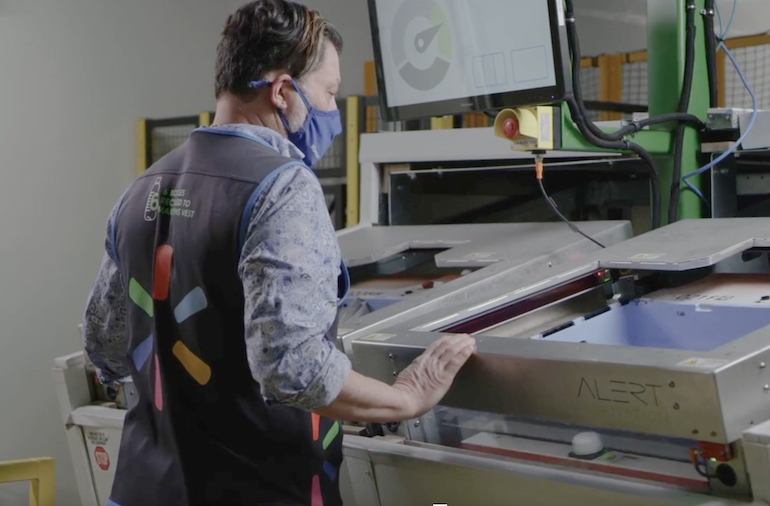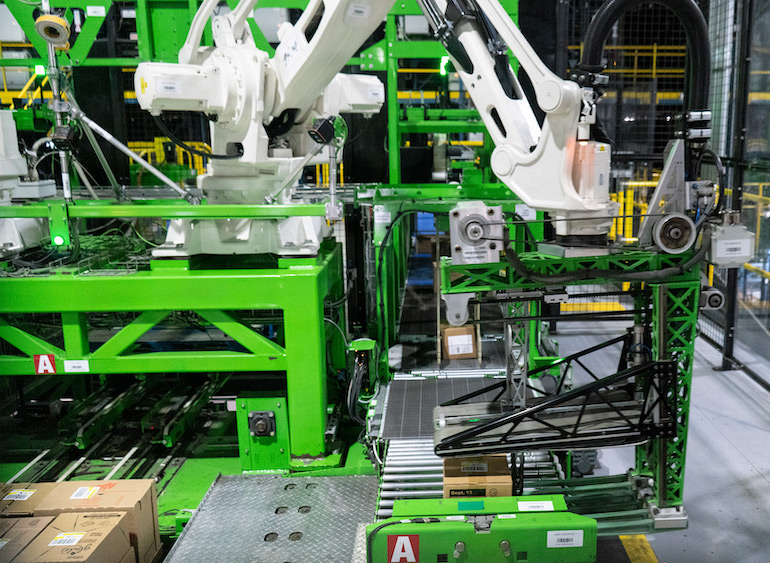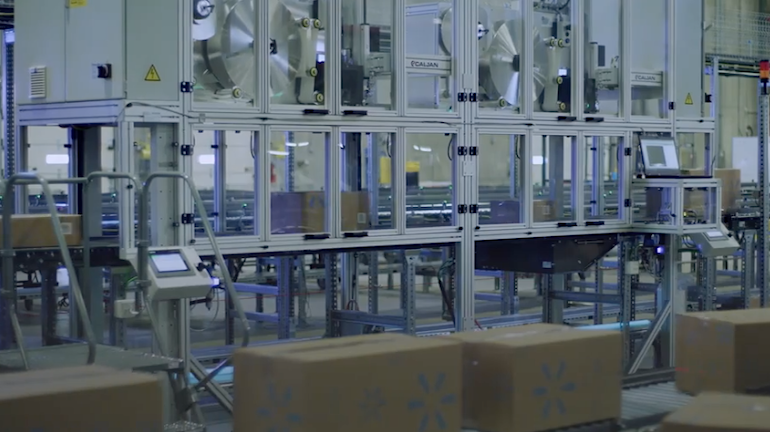Walmart is deepening its commitment to an automated supply chain with a deal to acquire grocery automation specialist and partner Alert Innovation.
Financial terms of the agreement weren’t disclosed. David Guggina, senior vice president of innovation and automation at Walmart, announced the planned purchase of Andover, Mass.-based Alert Innovation in a blog post on Thursday. With the addition of the robotics and automation company, Walmart will be better-positioned to leverage its more than 4,700 U.S. stores, situated within 10 miles of 90% of the population, for storage and fulfillment of online orders, he noted.
“For years, we have been making big investments in technology and infrastructure across our supply chain to test and learn where we can make the biggest difference in fulfilling customer orders. In recent years, we’ve announced investments in technology for our regional distribution centers and next-generation fulfillment centers. Our market fulfillment centers, or MFCs, are a continuation of these efforts,” Guggina said in the blog. “Today, we are announcing a step forward in the evolution of our supply chain and MFCs. I’m pleased to announce that Walmart has agreed to acquire Alert Innovation, a robotics automation company that develops material-handling technology for automating order fulfillment in retail supply chains.”

A Walmart store associate adds items retrieved by the Alphabots to online orders at a picking station in the MFC.
Walmart and Alert Innovation have partnered to customize technology for the retail giant’s MFCs since 2016 and began piloting the Alphabot System in Walmart’s first MFC in Salem, N.H., in 2019.
Stores are a foundation of Walmart’s last-mile strategy and already have been serving in a range of roles, from pickup and delivery hubs to testing grounds for emerging technology. In early 2021, Walmart unveiled plans to add micro-fulfillment centers to more of its stores — with the facilities located inside or attached to stores — via partnerships with three automation technology providers: Alert Innovation, Fabric and Dematic.
The MFCs, previously known as local fulfillment centers (LFCs), serve as automated fulfillment facilities inside stores (click here to see video). Using robotics technology and artificial intelligence, the facilities fill online orders for pickup and delivery more quickly, enabling Walmart stores to handle increased digital order volume and provide more convenience to customers. The MFCs can store thousands of products, with items ranging from fresh and frozen food and other consumables to electronics. Automated bots retrieve ordered items from the fulfillment center, instead of an associate having to walk the store to pick products from shelves. The items then are brought to a picking workstation, where the order can be assembled faster.
“For customers, this means orders can be fulfilled quickly and conveniently through pickup and delivery, giving them the items they want, when and where they want them. This system also enhances the experience for associates, who are integral to helping us perfect the system,” Guggina explained, citing the benefits of Alert’s technology.

Walmart aims to automate all its regional distribution centers under an expanded partnership with AI and robotics specialist Symbotic.
“In late 2019, we began piloting our first MFC in Salem, N.H., using bot technology from Alert specifically built for Walmart. The bot technology is notable within the industry due to its fully autonomous bots that store, retrieve and dispense orders by moving horizontally, laterally and vertically across three temperature zones without any lifts or conveyors,” he said. “This provides fewer space constraints inside the MFC and eliminates the need to pause the entire system for bot maintenance.”
Plans call for the Alert team to join Walmart, bolstering its bench of technology and engineering talent, and for the Bentonville, Ark.-based retailer to scale up Alert’s capabilities to spur its MFC strategy.
“We will continue leveraging our development, manufacturing and deployment expertise to enable Walmart to build and scale MFC technology in its stores,” Alert Innovation CEO Fritz Morgan said in a statement. “With Walmart, we have the opportunity to positively impact millions of lives through the Alphabot System.”
In announcing its MFC strategy this past March, Walmart reported that in 2021 it boosted pickup and delivery capacity by 20% to meet digital demand, and the company plans to add another 35% capacity in 2022. The retailer said at the time that, over the past year, it has increased the number of orders coming from its stores by 170%, which came atop growth of over 500% the year before.

Walmart said its new high-tech fulfillment centers will use automation to provide online consumers with access to next- or two-day shipping on more items than ever before.
“Bringing the best of Alert’s technology and capabilities in-house will enable us to reach customers quicker by deploying MFCs with greater speed, providing both an unmatched shopping experience and a competitive advantage in omnichannel fulfillment. This is part of our broader goal to introduce the next generation of fulfillment centers and continue to transform our already world-class supply chain,” according to Guggina. “Looking ahead, we will continue to modernize our supply chain operations through investments in robotics and automation in our stores and distribution and fulfillment centers, creating exciting new experiences for customers that are unique to Walmart.”
The Alert Innovation deal dovetails with Walmart’s ongoing efforts to automate its supply chain. In May, Walmart said it aims automate all its regional distribution centers under an expanded partnership with AI and robotics specialist Symbotic. Plans call for Walmart to deploy Symbotic’s robotics and software automation platform at all 42 of its regional DCs. In July 2021, Walmart had announced that Symbotic’s technology would be implemented in 25 regional DCs.
Last week, Walmart opened the first of four new automated fulfillment centers in Joliet, Ill. Besides the 1.1 million-square-foot Joliet facility, the locations include a 2.2 million-square-foot center to open in McCordsville, Ind., in spring 2023 and a 1.5 million-square-foot center to open in Greencastle, Pa., in 2024. Walmart didn’t disclose the location of the fourth automated fulfillment center, but t Bloomberg reported that the facility is slated for Texas.
The fulfillment centers (FCs) differ in function from distribution centers (DCs). FCs are used to store millions of items ordered via Walmart.com to be picked, packed and shipped directly to customers as soon as the next day. Meanwhile, the retailer’s DCs focus on receiving, storing and distributing product to Walmart stores.
Walmart also has two high-tech consolidation centers in Lebanon, Pa., which opened in August, and in Colton, Calif., launched in 2019. The consolidation centers use automation to enable three times more volume to flow through the supply chain, according to Walmart. The facilities receive general merchandise items from suppliers in smaller freight loads, known as less than a truckload (LTL), and consolidate them into larger freight loads, or full truckloads (TL). Product is then shipped to regional DCs, where it is sorted before going to stores.


